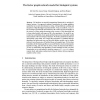Free Online Productivity Tools
i2Speak
i2Symbol
i2OCR
iTex2Img
iWeb2Print
iWeb2Shot
i2Type
iPdf2Split
iPdf2Merge
i2Bopomofo
i2Arabic
i2Style
i2Image
i2PDF
iLatex2Rtf
Sci2ools
126
Voted
RECOMB
2005
Springer
2005
Springer
The Factor Graph Network Model for Biological Systems
Abstract. We introduce an extended computational framework for studying biological systems. Our approach combines formalization of existing qualitative models that are in wide but informal use today, with probabilistic modeling and integration of high throughput experimental data. Using our methods, it is possible to interpret genomewide measurements in the context of prior knowledge on the system, to assign statistical meaning to the accuracy of such knowledge and to learn refined models with improved fit to the experiments. Our model is represented as a probabilistic factor graph and the framework accommodates partial measurements of diverse biological elements. We develop methods for inference and learning in the model. We compare the performance of standard inference algorithms and tailor-made ones and show that hidden variables can be reliably inferred even in the presence of feedback loops and complex logic. We develop a formulation for the learning problem in our model which is ...
Approach Combines Formalization | Computational Biology | Deterministic Hypothesis Testing | RECOMB 2005 | Uncharacterized Logical Relations |
Related Content
| Added | 03 Dec 2009 |
| Updated | 03 Dec 2009 |
| Type | Conference |
| Year | 2005 |
| Where | RECOMB |
| Authors | Irit Gat-Viks, Amos Tanay, Daniela Raijman, Ron Shamir |
Comments (0)

